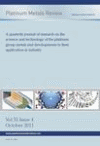-
oa Ruthenium-Mediated Electrochemical Destruction of Organic Wastes
- Source: Platinum Metals Review, Volume 42, Issue 3, Jul 1998, p. 90 - 98
Abstract
No industrial process is 100 per cent efficient and the generation of waste, both organic and inorganic, is an unavoidable reality. The recycling of waste is becoming increasingly important as concerns about the environment and the availability of resources come more to the fore, but there remain many waste streams which are not yet suitable for recovery of their reusable content, on the grounds of cost or practicality. Historically, the disposal of such wastes has been either via incineration or release into the environment after neutralisation or immobilisation, in a landfill site or into a drain or sewer, or the like. These options are becoming more restricted as regulations tighten and public perception of any but the most benign discharges worsens. This paper sets out reasons for using electrochemical oxidation with a ruthenium electro-catalyst to provide an effective and environmentally friendly alternative to other technologies. Electrochemical oxidation can effect mineralisation of toxic organic species with minimal generation of secondary waste and efficient recovery of the ruthenium mediator and is particularly suited for the treatment of highly chlorinated and aromatic compounds.


